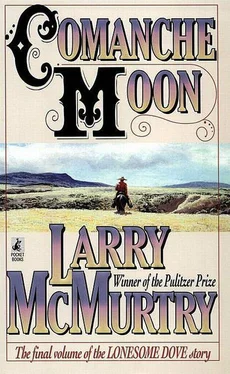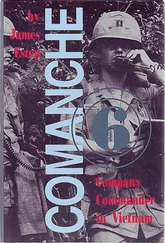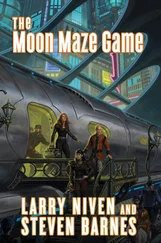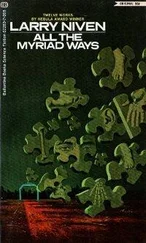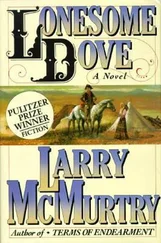When Buffalo Hump asked about Quanah, Kicking Wolf did not answer immediately. The subject seemed to annoy him.
"I took him four good horses but he didn't want them," he said, finally.
"Did you try to fool him?" Buffalo Hump asked. "I remember that you used to try and trade me bad horses. You only wanted to trade the horses there was something wrong with. Maybe Quanah is too smart for you. Maybe he knew those horses had something wrong with them." Kicking Wolf immediately rose and prepared to leave.
"There was nothing wrong with the horses I took him, or with the horses I traded you, either," he said. "Someday Quanah will wish he had horses as good as those I took him." Then he walked away, to the embarrassment of Heavy Leg and Lark, who had been preparing to offer him some of the coon--t was the polite thing to do. When Buffalo Hump visited Kicking Wolf he always politely ate a little of what Kicking Wolf's wives had prepared. He was a good guest--he did not simply get up and leave just as the meal was ready. Lark and Heavy Leg were afraid they might have done something to offend their guest. Perhaps he was forbidden to eat coon? They didn't know what to think, but they were fearful. If they had erred, Buffalo Hump would surely beat them--since his sickness he was often in a bad temper and beat them for the smallest errors in the management of the lodge. They knew that the beatings mainly came about because Buffalo Hump was old and ill, but they were severe beatings anyway, so severe that it behooved them to be as careful as possible.
This time, though, Buffalo Hump merely ate his food; he said nothing to his wives. It amused him that Kicking Wolf was annoyed with Quanah, the young war chief of the Antelopes, just because he was a good judge of horseflesh. It only impressed Buffalo Hump more, that Quanah had refused to trade with Kicking Wolf. Living where he lived, on the llano, where the distances to be travelled were great and the forage sparse, a war chief could not afford to make mistakes about horses. If a horse's feet were poor it might imperil the success of a hunt, and the P's survival depended on the hunt.
Of course, Kicking Wolf was notorious--and had been throughout his whole career as a thief--for attempting to trade off horses that looked like fine horses but that had one hard-to-detect flaw. Perhaps a given horse was deficient in endurance, or had no wind, or had hooves that were prone to splitting. Kicking Wolf was skilled at glossing over flaws that only a man with an experienced eye could see. There was a way of knowing that some men had and some men didn't. Kicking Wolf could watch a horse graze for a few minutes and know whether he was watching a good horse. But fewer and fewer could do that. Buffalo Hump had never been an exact appraiser of horseflesh himself. What he knew was that Kicking Wolf was tricky and that he ought to be wary of the horses that Kicking Wolf praised the most.
It amused him to think that this boy, this half-white war chief, Quanah, might know the same thing: that Kicking Wolf was sly, too sly to be easily trusted when it came to horses.
Naduah was nursing the child when the other women began to scream. She had been dreaming while the little girl nursed, dreaming of the warm lodge they could build if Peta was successful in the hunt and brought some good skins for her to clean and tan. The men had left early, to hunt--only an hour before, Peta had been there.
There were a few slaves in the camp, young Kickapoos who had been caught only a week before. The white men charging at them on the horses were shooting the young slaves, thinking they were warriors. Before Naduah could run, the Texans were all around her. Her little girl, Flower, was a speedy child; she was almost two years old and could run as fast as any of the little children in the camp.
Before Naduah could flee, Flower dropped the breast and ran, crazed with fear of the Texans.
She almost ran under one of the charging horses, but the rider pulled up just in time. The wind was up--dust swirled through the camp. In the confusion, with the dust blinding them, the Texans were shooting at anyone who ran, whether woman or slave. Naduah only wanted to catch her child before one of the horses injured her. Her hope was that Peta and the other hunters would hear the shooting and come back to attack the Texans.
Just as Naduah caught up with her little girl she turned and saw two men aiming rifles at her. They were going to shoot her down. The wind blew her clothes away from her legs. She held tightly to Flower, regretting that there was no time to hide her. If she could just hide the child well, then even if she herself were killed the men would return and find her. Flower would live.
Naduah thought death was coming, but the first man suddenly lifted his rifle and put out his hand to keep the other Texan from shooting. The first rider jumped off his horse and grabbed Naduah, to pull her aside so that none of the Texans would ride her down or shoot her. Some of the other women had been killed, and others were fleeing with their children. Naduah tried to pull free and run, but the man who held her was strong; though she fought and scratched she could not break free.
When the shooting stopped several of the Texans gathered around her--theirthe smell was terrible. They peered into her eyes and rubbed her skin. One even lifted her garments to stare at her legs. Naduah thought rape was coming, the rape that many women experienced when a camp was invaded. The Texans kept rubbing her skin, arguing with one another. Naduah thought they were only arguing about who would rape her first, but the men didn't rape her. Instead, they began to make plans to take her with them--when Naduah saw what they were about she began to scream and try to free herself. She could not stand the touch of a Texan: their breath smelled like the breath of animals and their eyes were cruel.
Naduah screamed and fought; when she got a hand free she began to rake at herself, clawing at her breast to make herself bloody and ugly, so the Texans would leave her to run away with the other women. She knew Peta would come back, if she could only find a hiding place where she could wait for him.
The Texans would not free her, though. They tied her hands and put her on a horse, but Naduah immediately rolled off and ran a few steps before the Texans caught her again. This time, when they put her on the horse, they tied her feet under the horse's belly, so she could not get free. Some of the men rode off rapidly toward the west, in the direction Peta had gone with the other hunters. Naduah hoped that Peta was too far away for the Texans to catch. There were too many Texans for Peta and the few hunters to fight.
Other warriors had already taken the stolen horses north--it was mainly the horses that the Texans wanted.
Soon the riders came back and the Texans began to ride south. Naduah screamed and struggled with her bonds. She wanted the Texans to leave her. Two women lay dead at the edge of the camp, shot by the Texans in the first charge.
But Naduah was tied to the horse and could not escape. She wished she could be dead, like the women whose bodies she had seen. She thought it would be better to be dead than to be taken by the Texans, men whose breath smelled like the breath of beasts.
"She might be the Parker girl," Goodnight said, as they rode away from the Comanche camp. The blue-eyed woman tied to the horse behind them screamed as if her life were ending. Call had his doubts about taking the woman back; even Goodnight, who led the horse she was on, seemed to have his doubts. All of them had seen what happened when captive white women were returned to white society. Grief was what happened, and the longer the captivity the less likely it was that the women could accept what they would have to face, or be accepted even by the families who had wanted them back. Most of the returned captives soon died.
Читать дальше
